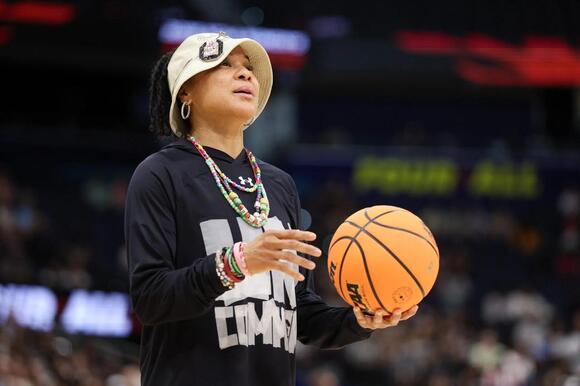Dawn Staley: A Comprehensive Profile and Credentials Analysis for the New York Knicks Head Coaching Role
Dawn Staley, the head coach of the South Carolina Gamecocks women’s basketball team, is widely recognized as one of the most accomplished figures in basketball—both as a player and as a coach. Her name surfacing as a potential candidate for the New York Knicks head coaching position might initially seem unconventional given her current role in women’s college basketball. However, a deep dive into her credentials reveals a profile steeped in leadership, strategic acumen, and championship pedigree that could translate well to the NBA. This article aims to provide an exhaustive look at Staley’s background, achievements, coaching style, and the qualities that make her a credible candidate for an NBA head coaching role.
Dawn Staley was born on May 4, 1970, in Philadelphia, Pennsylvania, and her journey through basketball began in the city’s competitive hoops culture. She attended Dobbins Technical High School in Philadelphia, where her exceptional talent quickly became evident. She was a McDonald’s High School All-American and one of the nation’s most highly recruited players.
Staley chose the University of Virginia (UVA) for her collegiate career, where she played from 1988 to 1992. She was an immediate impact player and became a three-time All-American. Under the coaching of Debbie Ryan, Staley led UVA to three NCAA tournament appearances, including a Final Four appearance in 1991. She finished her collegiate career as the Atlantic Coast Conference’s all-time assists leader—a record that still stands.
Her playmaking ability, leadership on the court, and defensive tenacity distinguished her as a floor general, qualities essential for team leadership at any level.
Staley’s professional career included stints in the American Basketball League (ABL) and the Women’s National Basketball Association (WNBA). She was the first overall pick in the 1999 WNBA draft by the Charlotte Sting. Her WNBA career spanned six seasons, earning three All-Star selections.
Internationally, Staley represented the United States in multiple Olympics, winning three gold medals (1996 Atlanta, 2000 Sydney, 2004 Athens) and one bronze (2008 Beijing). Her international success underscored her ability to perform and lead on the world’s biggest stage.
Staley began her coaching career as an assistant coach at Temple University in 1997 while still playing professionally. She later took the head coaching role at Temple in 2000, where she revitalized the program, leading the Owls to three NCAA Tournament appearances in four years.
In 2008, Staley became the head coach of the South Carolina Gamecocks women’s basketball program. When she arrived, the program was middling in the Southeastern Conference (SEC) and had only one NCAA Tournament appearance.
Under Staley’s leadership, South Carolina became a national powerhouse. Key credentials from her tenure include:
- NCAA National Championships: Staley led the Gamecocks to their first-ever NCAA Women’s Basketball National Championship in 2017. She won her second national title in 2022.
- SEC Championships: Under her guidance, South Carolina has won multiple SEC regular-season titles and SEC Tournament championships, dominating one of the toughest conferences in women’s college basketball.
- NCAA Tournament Success: Consistently reaching the NCAA Tournament, including multiple Final Four appearances.
- Player Development: Staley has coached and developed numerous players who went on to have successful WNBA careers, such as A’ja Wilson, Aliyah Boston, and Mikiah Herbert Harrigan.
- Awards: She has won multiple SEC Coach of the Year honors and was named the Naismith College Coach of the Year multiple times.
Her teams are known for their suffocating defense, disciplined offensive execution, and high basketball IQ—hallmarks of excellent coaching.
One of Staley’s greatest strengths is her ability to build a winning culture based on accountability, resilience, and teamwork. She emphasizes character development alongside basketball skills, making her teams not only successful on the court but also respected for their professionalism and unity.
Her leadership style is inclusive yet demanding. She holds players to high standards but supports them with mentorship and guidance. This balance has created a sustainable winning program where players buy into her system fully.
Staley’s teams are known for their disciplined defensive schemes and efficient offensive execution. She designs game plans that exploit opponents’ weaknesses while maximizing her team’s strengths.
Her coaching adapts to personnel strengths, making her a flexible strategist. This adaptability is essential in the NBA, where rosters change frequently, and opponents come with diverse playing styles.
Staley has a proven track record of improving players’ skills, preparing them for professional careers. Her ability to develop talent speaks to her understanding of individual player needs and how to harness potential for team success.
At first glance, the jump from women’s college basketball to the NBA might seem unusual. However, the modern NBA is evolving, and franchises are increasingly looking for fresh perspectives, strong leadership, and innovative thinking. Here are some reasons why Staley’s credentials align well with what the Knicks may need:
Winning national championships in a competitive environment like the SEC and NCAA Tournament demonstrates Staley’s ability to manage pressure, prepare teams for big games, and execute winning strategies. The Knicks, seeking to build a culture of winning, could benefit from her championship pedigree.
The Knicks franchise has struggled with consistency and culture issues for many years. Staley’s reputation for building disciplined, resilient teams from the ground up would be invaluable in establishing a new winning culture.
The Knicks have a roster featuring young talent such as RJ Barrett and Jalen Brunson, alongside established veterans. Staley’s player development skills could accelerate the growth of young players while managing veteran leadership effectively.
NBA head coaches must adjust to in-game situations and manage complex rotations. Staley’s adaptable coaching style and high basketball IQ would translate well to the NBA, where tactical flexibility is critical.
Hiring Staley would also represent a groundbreaking move for the Knicks and the NBA, showcasing a commitment to diversity and innovation. She is already a trailblazer as one of the few African-American women to have such sustained success as a head coach in basketball.
While Staley’s credentials are impressive, transitioning to the NBA head coaching role is not without challenges:
- Experience with NBA Roster and Game Style: The NBA differs in pace, player management, and business dynamics compared to college basketball. Staley would need to adapt to managing professional athletes with different motivational and contract dynamics.
- No Previous NBA Coaching Experience: Unlike some coaches who have spent time as NBA assistants, Staley’s background is exclusively collegiate and international women’s basketball. This could be seen as a gap.
- Managing Media and Market Pressure: The New York Knicks play in one of the most scrutinized markets in sports. Handling media and fan expectations is a unique challenge.
However, many NBA coaches have overcome similar hurdles by leveraging their leadership, learning quickly, and surrounding themselves with experienced assistants.
SDawn Staley’s rise from a decorated player to a highly successful collegiate head coach highlights a basketball mind with exceptional leadership, strategic insight, and a proven ability to win. While her background is not traditional for an NBA head coach, the qualities she embodies—winning culture, player development, tactical intelligence, and resilient leadership—are precisely what a franchise like the New York Knicks could benefit from as they seek sustained success in one of the league’s most competitive markets.
The Knicks considering Staley for their head coaching role would reflect a bold step towards innovation and diversity in basketball leadership, potentially setting a precedent for how coaching talent is evaluated beyond conventional pathways. If given the opportunity, Dawn Staley could leverage her extensive credentials and transformative leadership skills to make a significant impact at the NBA level.



